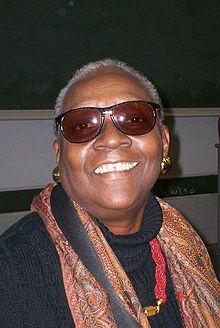Caribbean and Diaspora Studies Conferences and Events
Read about the CCDS events and conferences.
Primary page content

Maryse Condé and Caribbean Crossings: 10 May 2024
We express our profound sadness at the news of Maryse Condé’s passing on 2 April 2024. Our symposium, celebrating her work, will take on a different, more sombre mood, but we will want to celebrate her life too. As she writes in Tituba, the dead remain ‘here, all around us, eager for attention, eager for affection.’ We shall feel her presence, and give her our attention and affection.
A celebration of the work of Maryse Condé in the Caribbean context, jointly organised by the Centre for Comparative Literature and the Centre for Caribbean and Diaspora Studies at Goldsmiths, University of London, and the Institut français du Royaume-Uni.
To open the celebrations, a round table will be held at the Institute Français on the afternoon of 9 May 2024
Keynote Speaker: Simone A. James Alexander (Seton Hall University, USA)
Maryse Condé was the Caribbean island of Guadeloupe’s most fêted author, one of the French-speaking world’s greatest writers, the recipient of numerous major prizes and accolades, and the author of novels, plays, short stories, children’s books, memoirs and essays that criss-cross the Caribbean and the Black diaspora.
This conference, Maryse Condé and Caribbean Crossings, will examine how crossings manifest themselves not only geographically, but in multiple intersecting ways in Maryse Condé’s works. The conference will also honour her remarkable oeuvre by exploring its interconnections with, and impact on Caribbean literature, theatre and thought more broadly. Just one example of Condé’s extraordinary impact in the Caribbean is provided by the echoes of her writings found in the theatres of Ina Césaire, Simone Schwarz-Bart, Gerty Dambury and Suzanne Dracius.
Migration and exile in all directions along the triangular trans-Atlantic route – between Africa, the Caribbean and South America, between the Americas and Africa, between the Caribbean and Europe, between Europe and Africa – feature in much of her work, as do journeys that are more than merely spatial and include visitations from the world of spirits to the living by ancestors and parents, representing haunting, spectral stories that illustrate how the past – histories of enslavement, the Middle Passage, colonial occupation, racial discrimination, bereavement, filial alienation – resurfaces in successive generations. But the interaction between spirits and the living can also be protective, and establish connections between the sacred and the secular, thought and nature, animate and inanimate worlds, providing characters with insights and solace.
Condé’s characters are caught in the crossfire of history, the universes created by her writings are typified by hybridity, nomadism, métissage, creolity, multiculturalism and plurality, exploring syncretism both on national and global scales, in linguistic and cultural spheres, and on a personal level, where power dynamics play out between characters of different ‘races’, classes and genders.
Intertextual references abound in her work, which also combines her postcolonial revision of canonical works with more popular literary forms. Condé’s fiction lies at the aesthetic crossroads not only between the haut style of the French literary tradition and popular fiction, and between historical narration and fictional fabulation, but also between the intimately poetic and the cinematically epic, while navigating the choppy waters, at times courting controversy, between Caribbean artistic and activist movements like négritude, antillanité or créolité. As she expresses in her essay ‘Order, Disorder, Freedom, and the West Indian Writer’ (1993), she favours the fluidity of interconnections over the fixity of identity.
The notion of ‘crossing’, which features in the title of one of Condé’s novels, Crossing the Mangrove (1989), will guide enquiries and debates over the course of our conference. Examining how Condé’s works move across and between different aesthetic, linguistic, cultural, geographical, historical and ontological sites, this conference welcomes contributions on all Caribbean literature in the expanded sense – including theatre and performance – in French, English, Spanish and Creole.
For more information, please visit the Conference webpage.